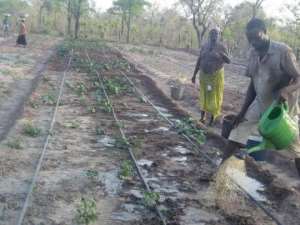
To help improve household's nutrition and ensuring food security, World Vision Ghana (WVG) and its partners have indicated their commitment to upscale dry season farming in the various communities of the Gushegu and Karaga area in the Northern Region.
The initiative that was successfully piloted in Wantugu and Gulugu is helping farmers to break the poverty cycle by producing high-quality vegetables for consumption and to raise income through the sale of the vegetables.
Mr Felix Apeti, the Gushegu Cluster Manager of WVG, who disclosed this to the Ghana News Agency during a field visit to the area said the innovation would give farmers a second farming season to engage in crop production.
'Traditionally, farming activities in Northern Ghana ends after harvesting between October and December, so many farmers become idle until late April when preparations for the next farming season starts,' he stated.
He described the garden as an innovation that draws water from a dugout dam into an overhead tank, which was then supplied, to the plants through drip irrigation lines.
To ensure the constant flow of water, the WVG water experts were also exploring options for securing other water alternative sources to support the functioning of the dam.
Mr Apeti said WVG was working with other stakeholders especially the district offices of the Ministry of Food and Agriculture (MoFA) to complete the business value chain models to secure a niche market for the produce.
'When this is well established we will have a unique opportunity to supply vegetables produced with fresh water that cannot be compared with other producers who use wastewater to irrigate their crops,' he added.
'We piloted with two gardens and we are going to add two more this year to ensure that community members get busy.
Regarding sustainability, Mr Apeti explained that all WVG interventions had been designed in such a way that it was led by the community members who would own it and take full responsibility.
'Similar to some of our models' farmers, we involve them in design, through to the implementation. At a point, farmers are required to make an investment in the form of ensuring that the farm works efficiently',
'Just like with other women, there is no farm work during this dry season, so I mostly stayed home and cooked. During the pilot they cultivated, bra, (Hibiscus sabdariffa) tomatoes and okro,' he added.
Madam Amina Saedu, a farmer in Kpatinga community, attests that 'The setting up of this garden has occupied my morning. On daily basis, during the dry season, I go to the farm with other women to either weed or harvest vegetables to sell.'
Mr Kojo Inusah, Corps Officer at the Gushegu MoFA office, said the office was prepared to support the initiative due to its ability to complement its mandate of reaching out to farmers with the right technology to boost production and improve the livelihood of the people.
Mr Inusah said although the Gushegu office had only seven officers serving as extension officers for over 10, 000 farmers they were committed to supporting farmers with the limited resource to turn the fortunes of farmers around.
On the use of certified seeds, he said only 10 per cent of farmers used certified seeds but now the rate had increased from between 25 to 40 per cent.
GNA
By Yaw Ansah, GNA




 Former Kotoko Player George Asare elected SRC President at PUG Law Faculty
Former Kotoko Player George Asare elected SRC President at PUG Law Faculty
 2024 elections: Consider ‘dumsor’ when casting your votes; NPP deserves less — P...
2024 elections: Consider ‘dumsor’ when casting your votes; NPP deserves less — P...
 You have no grounds to call Mahama incompetent; you’ve failed — Prof. Marfo blas...
You have no grounds to call Mahama incompetent; you’ve failed — Prof. Marfo blas...
 2024 elections: NPP creates better policies for people like us; we’ll vote for B...
2024 elections: NPP creates better policies for people like us; we’ll vote for B...
 Don’t exchange your life for wealth; a sparkle of fire can be your end — Gender ...
Don’t exchange your life for wealth; a sparkle of fire can be your end — Gender ...
 Ghana’s newly installed Poland train reportedly involved in accident while on a ...
Ghana’s newly installed Poland train reportedly involved in accident while on a ...
 Chieftaincy disputes: Government imposes 4pm to 7am curfew on Sampa township
Chieftaincy disputes: Government imposes 4pm to 7am curfew on Sampa township
 Franklin Cudjoe fumes at unaccountable wasteful executive living large at the ex...
Franklin Cudjoe fumes at unaccountable wasteful executive living large at the ex...
 I'll 'stoop too low' for votes; I'm never moved by your propaganda — Oquaye Jnr ...
I'll 'stoop too low' for votes; I'm never moved by your propaganda — Oquaye Jnr ...
 Kumasi Thermal Plant commissioning: I pray God opens the eyes of leaders who don...
Kumasi Thermal Plant commissioning: I pray God opens the eyes of leaders who don...
